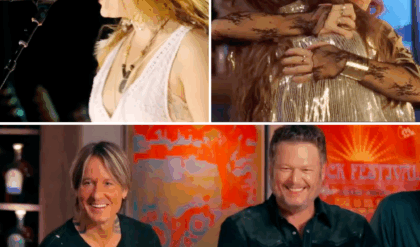In a shocking turn of events that has rocked the entertainment world, Canadian singer Michael Bublé found himself at the center of a storm of controversy in May 2020, following allegations of domestic abuse. The accusations arose after a livestream session on Instagram with his wife, Argentine actress Luisana Lopilato, during which a seemingly innocuous interaction sparked outrage among viewers. This incident not only threatened to tarnish Bublé’s carefully cultivated image as a charming, family-oriented crooner but also led to a wave of threats against his life, leaving his family in distress. Despite the couple’s attempts to clarify the situation, the episode highlighted the intense scrutiny celebrities face in the age of social media and raised broader questions about public perception, accountability, and the complexities of personal relationships in the public eye.
The incident occurred in April 2020, a time when much of the world was under lockdown due to the COVID-19 pandemic. Like many celebrities, Bublé and Lopilato turned to social media to connect with fans, offering a glimpse into their lives as they navigated quarantine together with their three children. The couple, who married in 2011, had long been seen as a picture-perfect pair, often sharing moments of joy with their family on social platforms. During one such Instagram livestream, the couple was singing and chatting with fans when an interaction between them set off alarm bells for some viewers. As Lopilato spoke, interrupting Bublé mid-sentence, he appeared to nudge her with his elbow. Though he quickly apologized and hugged her, the moment was enough to ignite a firestorm of speculation.
For many fans watching, the nudge was not a playful gesture but a red flag. Social media erupted with accusations that Bublé was displaying signs of abusive behavior. Comments flooded in, with some users labeling him as controlling and others outright accusing him of domestic violence. The hashtag #MichaelBubleAbuser began trending, and clips of the incident were shared widely, each view amplifying the narrative that Bublé had mistreated his wife. The reaction was swift and severe, with a segment of the public demanding accountability from the singer, whose public persona had always been one of warmth and affability.
The backlash didn’t stop at online criticism. According to a report by Eonline on May 15, 2020, the situation escalated to a dangerous level when Lopilato revealed that she and Bublé had received death threats. Anonymous individuals sent messages threatening to kill Bublé if he ever set foot in Argentina, Lopilato’s home country. Some messages were chillingly specific, with threats to “cut his fingers off,” plant bombs, or ambush him on the street. Lopilato, visibly shaken, shared her distress in a statement, saying, “Those messages keep me up at night with worry.” The threats were accompanied by images of weapons, adding to the family’s fear during an already challenging time.
The couple’s relationship had previously been a source of admiration for fans. Bublé, a Grammy-winning artist known for hits like Come Fly with Me and Caught in the Act, met Lopilato in 2008 after one of his concerts in Buenos Aires. They married three years later and have since welcomed three children: Noah, Elias, and Vida. Their family life, however, has not been without hardship. In 2016, their eldest son, Noah, was diagnosed with cancer at the age of three, a battle that tested the couple’s resilience. Bublé stepped away from his career to focus on his son’s treatment, and the family’s unity during that period earned them widespread support. Noah’s recovery was a triumph, but the 2020 incident threatened to overshadow the goodwill the couple had built.
In response to the allegations, Lopilato was quick to defend her husband. In multiple statements, she insisted that their relationship was strong and free of any significant conflict. “I want you all to understand that there are no issues between us,” she said in one interview. “If I could go back in time, I would choose him as my husband a thousand times over.” Her defense was heartfelt, but for some, it raised questions about whether she felt pressured to downplay the situation due to Bublé’s celebrity status or her own desire to protect their family’s privacy. Others saw her response as genuine, a reflection of a marriage that, while imperfect, was not abusive.
Bublé, for his part, remained largely silent on the matter, allowing Lopilato to take the lead in addressing the public. This decision, however, drew mixed reactions. Some praised him for not fueling the controversy further, while others interpreted his silence as an admission of guilt or a lack of accountability. The singer’s team issued a brief statement acknowledging the incident, describing it as a misunderstanding and affirming that Bublé and Lopilato were committed to their family. Yet, in the court of public opinion, where nuance often gives way to snap judgments, the damage was already done.
The incident with Bublé and Lopilato is emblematic of a larger cultural moment. In 2020, the #MeToo movement was still a powerful force, encouraging victims of abuse to speak out and holding public figures to higher standards of behavior. At the same time, the rise of social media has made it easier for fans to scrutinize every aspect of a celebrity’s life, often jumping to conclusions based on limited context. The livestream clip of Bublé nudging his wife was viewed millions of times, each share accompanied by commentary that ranged from concern to outright condemnation. While some viewers genuinely believed they were witnessing abuse, others may have been swept up in the viral nature of the controversy, eager to participate in the collective outrage.
This phenomenon raises important questions about the role of the public in policing celebrity behavior. On one hand, social media has given a platform to those who might otherwise remain unheard, allowing for greater accountability. On the other hand, it has also created an environment where misunderstandings can be blown out of proportion, leading to real-world consequences like the threats faced by Bublé and his family. The line between legitimate concern and mob mentality can be thin, and in this case, the reaction may have crossed into dangerous territory.
It’s also worth considering the cultural context of the incident. Bublé, a Canadian, and Lopilato, an Argentine, come from different backgrounds, and their dynamic may reflect cultural norms that differ from those of their audience. What some viewers interpreted as aggression might have been a casual, albeit poorly timed, interaction between a couple comfortable with each other. Without a deeper understanding of their relationship, it’s difficult to make a definitive judgment about the incident. However, the public’s response underscores the heightened sensitivity to issues of domestic violence, particularly in the wake of high-profile cases that have dominated headlines in recent years.
For Bublé, the controversy was a rare blemish on an otherwise stellar career. Born in Burnaby, British Columbia, in 1975, he rose to fame in the early 2000s with his smooth vocals and retro style, often compared to legends like Frank Sinatra. His albums have sold millions worldwide, and he has won multiple Grammy Awards, cementing his status as one of the most successful artists of his generation. Offstage, Bublé has cultivated an image as a devoted husband and father, often speaking about the importance of family in his life. The allegations of abuse, therefore, struck at the core of his public identity, challenging the narrative he had built over decades.
Lopilato, too, has a successful career as an actress and model in Argentina, known for roles in shows like Rebelde Way. She has often spoken about her admiration for Bublé, describing him as a supportive partner and father. In the aftermath of the incident, she doubled down on this narrative, perhaps in an effort to protect their family from further scrutiny. Yet, her insistence that all was well did little to quell the concerns of those who remained skeptical, some of whom speculated that she might be minimizing the situation to avoid further conflict.
As the dust settled, the incident faded from the headlines, but its impact lingered. For Bublé and Lopilato, the threats they received were a stark reminder of the darker side of fame, where a single moment can spiral into a nightmare. The couple has since continued to present a united front, sharing glimpses of their family life on social media and focusing on their children. Bublé returned to music, releasing new projects and embarking on tours, while Lopilato pursued her acting career.
The controversy surrounding Michael Bublé serves as a cautionary tale about the power of perception in the digital age. What began as a fleeting moment during a livestream became a global talking point, exposing the fragility of a celebrity’s reputation and the challenges of navigating personal relationships under public scrutiny. While the truth of what happened between Bublé and Lopilato may never be fully known, the incident underscores the need for empathy and understanding in an era where judgment is often swift and unforgiving. For now, the couple appears to have moved past the ordeal, but the shadow of that April livestream remains a poignant reminder of how quickly the magic of fame can turn into a nightmare.





